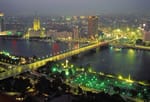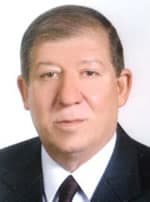THE MIDDLE EAST
Economic reforms are spurring a flood of private sector investment that is helping to put the regions liquidity to productive use.

The Manhattan skyline that erupted from the desert flatlands of Dubai is a symbol of a broader resurgence in Arab economies, even those lacking huge oil surpluses, such as Egypt and Jordan. The boom, which began at the turn of the 21st century and shows no sign of letting up, is the result of the vision and ingenuity of a new generation of leaders that have embraced economic reforms and social development. By promoting investments in infrastructure and human resources, they are inspiring confidence in business and financial circles. The new Arab economies are attracting huge inflows of foreign investment and challenging long-held beliefs that the Arab world is destined for stagnation.
The Middle East is an interesting and challenging region with political turmoil and booming economies, says Yasser El Mallawany, chairman and CEO of Cairo-based EFG-Hermes Holding, an investment bank and the leading securities broker on the Cairo & Alexandria Stock Exchange (CASE). Other countries in the region are competing for a place in the emerging markets universe, he says.
The major oil-producing countries of the Gulf are flooding with liquidity, El Mallawany says, but the question remains, how well will they continue utilizing those resources? There has been more domestic and regional investment in this oil-price boom than in previous ones, and excess liquidity is creating bubble-like conditions in some sectors, particularly in certain property markets.
Rents for residential units in Dubai increased by 30% on average in 2006, driven by fast-rising demand, according to a 45-page analysis by EFG-Hermes, which has an office in the Gate, the building that houses the Dubai International Financial Center. Demand for commercial property has likewise been far outpacing supply, resulting in an acute shortage and sending rents soaring.
The market is changing, however, with the available commercial space forecast to triple by 2010 and an oversupply in housing units starting in 2008. With continued strong population growth and an influx of expatriates, all signs are that any softening in the Dubai real estate market may come gradually rather than all at once, according to EFG-Hermes. Abu Dhabi, the UAE capital, has more than $125 billion of real estate projects planned in the next 15 years.
Meanwhile, the countries of the Middle East are becoming more closely integrated into the global economy and are competing for foreign direct investment (FDI), El Mallawany says. Egypt, in particular, is attracting a major net inflow of FDI, thanks to its stability and human capital, he says. The country has the largest population in the region and a consumer market with growing purchasing power.
Egypt expects FDI to climb to between $7.5 billion and $8 billion in the year ending in June 2007, up from a record $6.1 billion a year earlier, which was equal to the net inflow to India. This year Egypt is expected to eclipse South Africa as the recipient of the largest amount of direct investment in the Africa and the Middle East region, according to the Washington, DC-based Institute of International Finance.
The United Arab Emirates was the biggest investor in Egypt last year, with a consortium headed by Dubai-based Etisalat paying $2.9 billion for Egypts third mobile phone network. Other big investments were made in heavy industry, cement, chemicals, real estate, tourism and retail industries.
Egypt is in a paradigm shift, El Mallawany says. In July 2004 a new reform-minded cabinet headed by Prime Minister Ahmed Nazif was appointed and has taken dramatic steps to open Egypts markets to foreign trade and investment, cut corporate and business taxes, privatize and restructure public companies and create a business-friendly climate. The government remains committed to its reform program, and the large capital inflows are boosting business confidence, El Mallawany says. As a result, the private sector has become more dynamic and is reaching across borders to forge marketing, financial and supply chains on a regional basis. In January, Egypt and Turkey ratified a free-trade agreement that is expected to triple bilateral trade in three years to $3 billion.
Egypts new economic team has done an unbelievable job, says Mohamed Younes, chairman of New York-based Concord International Investments, the first international firm to obtain a license to establish a branch in Egypt to manage mutual funds. There is vitality in the economy, and growth and momentum, he says from his townhouse office in the Garden City district of Cairo. Egypt has strong economic fundamentals. Real gross domestic product is growing at a 7% annual rate, and we expect the inflation rate to drop in 2007 as a result of the stability of the Egyptian pound against the dollar, he says.
There have been dramatic improvements in the countrys balance of payments following the currency devaluation in 2001. Egypt now has a current account surplus and a strong foreign-currency reserve position of approximately $26 billion in December 2006, up from $22.9 billion last June.
All of the countrys main sources of foreign currency are rising, including oil and non-oil exports, tourism revenues, remittances of Egyptians abroad and Suez Canal revenues, which have reached a record, due to high oil prices and increased military traffic in the region, Younes says. While Egypts oil production is declining, natural gas is taking up the slack.
Egypts tourist arrivals reached a record 9 million in 2006 and are forecast to reach 27 million by 2017, as the Red Sea and Sinai resorts attract more winter visitors from Europe, while cultural sites such as the pyramids remain popular. Despite various terrorist incidents that took place in Egypt in the past decade, tourism is on the rise and still has a lot of potential. Developers are taking note: Emaar Properties, based in the United Arab Emirates, recently acquired prime luxury real estate on Egypts Mediterranean coast for $175 million.
Electricity consumption has been increasing at a rate of about 8% annually since 2000, which is a sign of broad growth in the economy, Younes says. Egypt also has an active market for corporate acquisitions, with foreign buyers accounting for more than half of the total value. In January 2007, Concord International joined a consortium that included Citigroup Venture Capital International and Capital International Private Equity in acquiring 98% of Amoun Pharmaceutical in Egypt for $500 million.
In a year that ended in the red for most Middle East stock markets, the CASE saw its 30-stock benchmark index rise more than 10%. Furthermore, our core trading business has performed very well, whereby turnover almost doubled, confirming the resilience of the Egyptian market, says Maged Shawky, chairman of the exchange. Foreign investors now constitute more than 30% of our daily volume, and this share continues to grow on an annual basis, which is way ahead of the neighboring markets and proves the openness of our market.
The stock exchanges performance is a reflection of the changes that have taken place in the wider economy, Shawky says. The banking sector has become healthier. The spinning and weaving sector, which had been dormant for many years, is one of the most active sectors now. In the oil and gas sector, Alexandria Mineral Oil and Sedi Kerir Petrochemicals are two of the most actively traded companies.
Egypts privatization program was the engine of growth for stock market activity in the past. Now it is different due to the depth and sophistication of the market, Shawky says. We see companies that are listed in London and Egypt coming to the market for capital increases, and family-owned companies that are opening to investors, such as Oriental Weavers and Seweedy Cables.

|
|
|
Shawky says he expects to see more such transactions in the coming years. A lot of private equity, whether listed or not, is being injected into the local market and this will certainly increase our momentum, he says.
Most of the top 30 companies that have listed on CASE have started to expand on a regional and international basis, the exchange chairman says. They have begun affiliating with brand names or exporting brand names, he says.
CASE recently signed an agreement with OMX, the operator of stock exchanges in seven Nordic and Baltic countries, to upgrade the Egyptian exchanges trading systems in 2008. Shawky says the plan is to build a trading platform for both cash and derivatives markets. This will enable CASE to introduce new products, such as exchange-traded funds, futures and options. The exchange is working with several local firms to launch ETFs on its CASE 30 index. It also would like to introduce new Islamic financing products.
The exchange has developed new listing rules that will be issued shortly, Shawky says. The new rules will reflect our commitment to disclosure and transparency, he says. The rules will allow new instruments, named Egyptian depository receipts, to be listed by foreign companies through a custodian. This is part of the exchanges strategy for cross listings with regional and international exchanges, he explains.
While privatizations are a centerpiece of the governments reform program, Hisham Ezz Al-Arab, chairman and managing director of Commercial International Bank, Egypts largest and most profitable private bank, says a significant portion of Egypts FDI inflow has been invested in greenfield projects. The country is now reaping a payback for its reform efforts, he says. It takes time to open the eyes of investors.
Were it not for the political instability of the Middle East, economic progress would have come more quickly to the region, Ezz Al-Arab says. There is a lot happening in investment banking and private equity, and I have a strong feeling it will continue, he says.
Jordan Tempts Investors
Jordan is another country in the region that has benefited from dramatic and systematic economic reforms. The Jordanian economy is performing well despite the countrys lack of natural resources. Liquidity is flooding in from the Gulf, and 45% of the investors on the Amman Stock Exchange are foreigners.

|
|
|
Ziad Fariz, deputy prime minister and minister of finance, says that Jordan was one of the early reformers in the Middle East and that the countrys tax and investment laws were designed to be friendly toward investors. We want to ensure that investors in the market are treated fairly, he says. We also want to make doing business in Jordan a very attractive process.
Last year Jordan received $3 billion in foreign direct investment, including about $800 million from privatization proceeds, according to Fariz. We have no natural resources except for potash and phosphate, so human resources are the countrys wealth, he says. Jordan has put a lot of effort into investing in education, and our labor force is well educated and motivated.
Fariz says it is impossible to discuss the Jordanian economy without mentioning tourism. We are the crossroads of the worlds great religions and have numerous religious and historical sites and great natural beauty, he says. Tourist arrivals rose 7.4% to 4.9 million in 2006.
A favorite tourist destination is the ancient city of Petra, which was carved out of rock thousands of years ago and was the capital of the Nabataean civilization. The World Bank in February approved a $56 million loan to support Jordans efforts to promote tourism and economic development in the countrys most important cultural cities, including Jerash, Karak, Madaba, Salt and Ajloun.
Jordan has 64,000 tourism sites, including the Dead Sea and the Roman Theater in Amman, says Akel Biltaji, a senator in the upper house of parliament and chairman of the tourism and heritage committee. The countrys largest property and tourism development is a $1 billion waterfront development in Aqaba, Jordans Red Sea port. Owned by Saudi company Astra, Ayla Oasis Development will include 800 residential buildings and 1,500 rooms in four-star and five-star hotels. Work will begin in 2009 on Saraya Aqaba on the western tip of the city, which will include five-star hotels operated by Dubai-based hospitality group Jumeirah. Tala Bay, the hub of the resort, was established in 2000.
Aqaba is also a working port and includes a qualifying industrial zone, or QIZ. The United States established QIZs in Jordan to support the peace process. Goods from these zones can be exported duty- and quota-free to the US.
Biltaji, former chief commissioner of the Aqaba Special Economic Zone Authority, says its original goal in 2000 was to attract $7 billion in investment by 2020. The zone already has achieved $8 billon in investment and has raised its 2020 target to $12 billion.

|
|
|
Foreign direct investment has been motoring here since July of last year, says Ray Webber, chief executive of HSBC Bank Middle East (Jordan), from his office in Amman. Lots of money is flowing in from Kuwait and the Emirates because the country has been underdeveloped. Jordan is stableremarkably so, considering its neighbors.
At least 750,000 Iraqi refugees have crossed the border into Jordan. The more affluent Iraqis have brought in wealth that has caused property prices to escalate. The new arrivals are also putting a strain on the countrys limited water resources.
Jordans gross domestic product is growing at a rate of about 7% a year, which likely will continue for at least the next three years, Webber says. HSBC Jordan advised on the recent privatization of Jordan Phosphate Mines and is working on developing pre-tenders for the expansion of the Queen Alia International Airport near Amman.
Some 32 Jordanian companies are currently listed for privatization, says Nour Nahawi, managing director and CEO of Arab Banking Corporation (Jordan). Royal Jordanian Airlines will be privatized by the end of 2007, with a 74% stake to be sold in an initial public offering.
Jordan is a well-managed country with highly educated and skilled manpower, Nahawi says. Money from the Gulf is pouring in, and we have a dynamic young king [Abdullah II] and the proper structure and laws that protect investors.
Arab economies have started to reach the age of maturity, and they now recognize that economies in the region can complement each other, Nahawi says. The less-fortunate countries in the Middle East are finally getting a piece of the action, he says, and its coming from the private sector.
Gordon Platt



